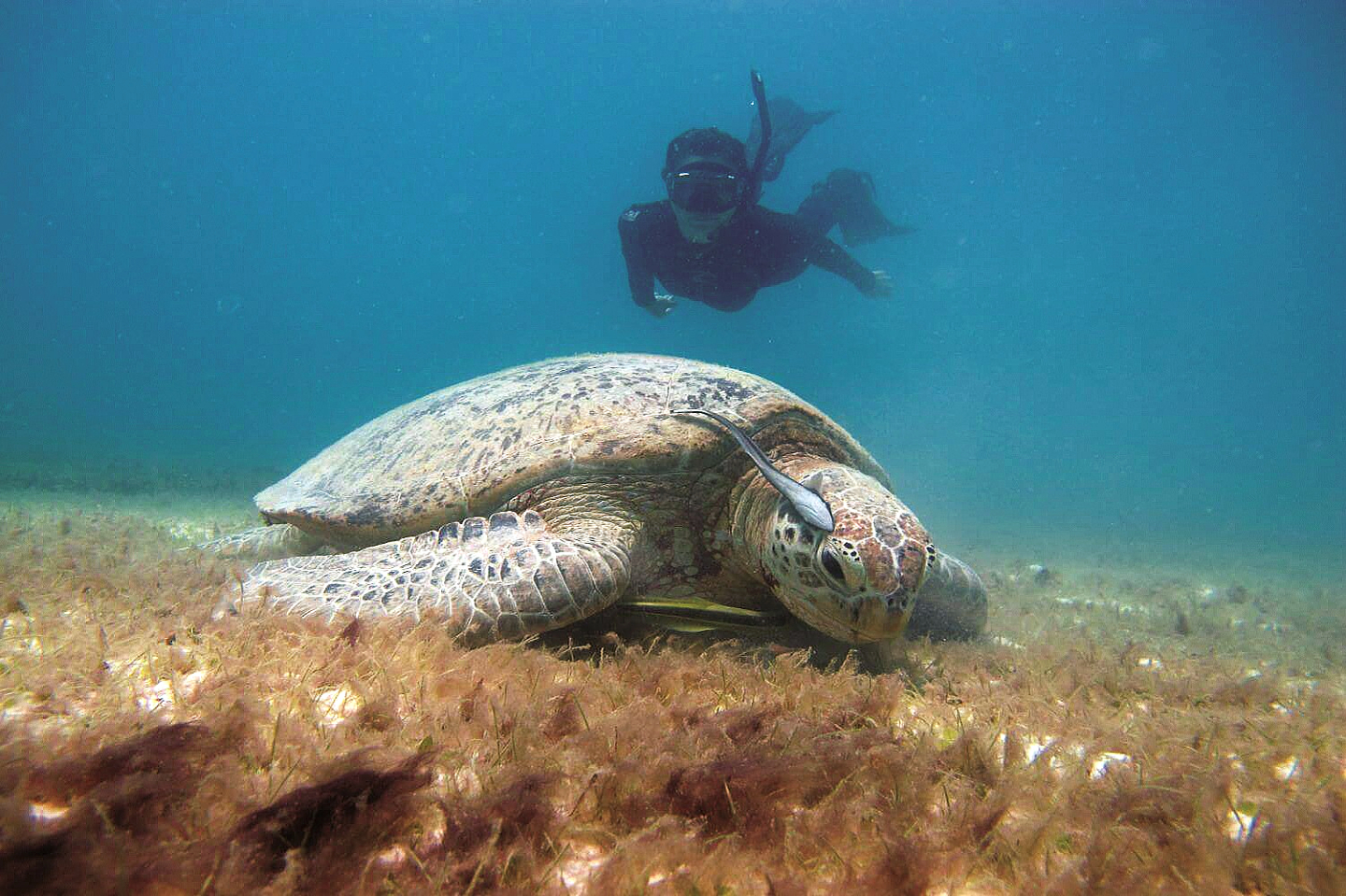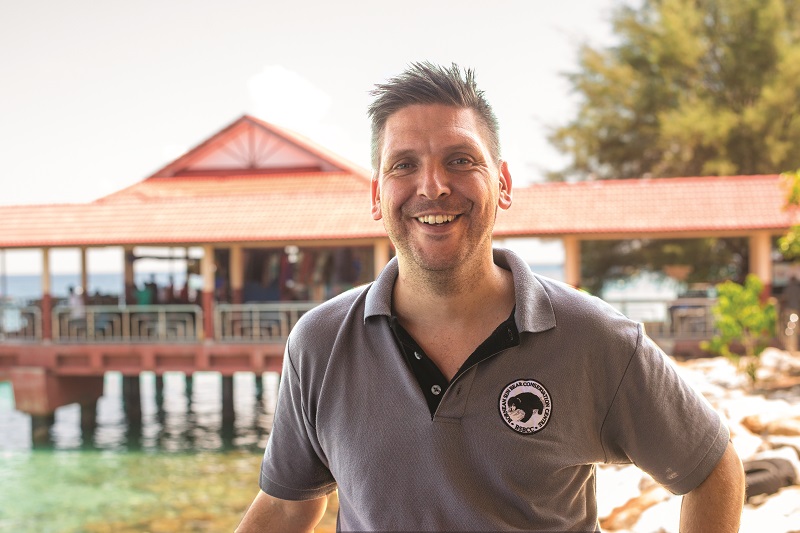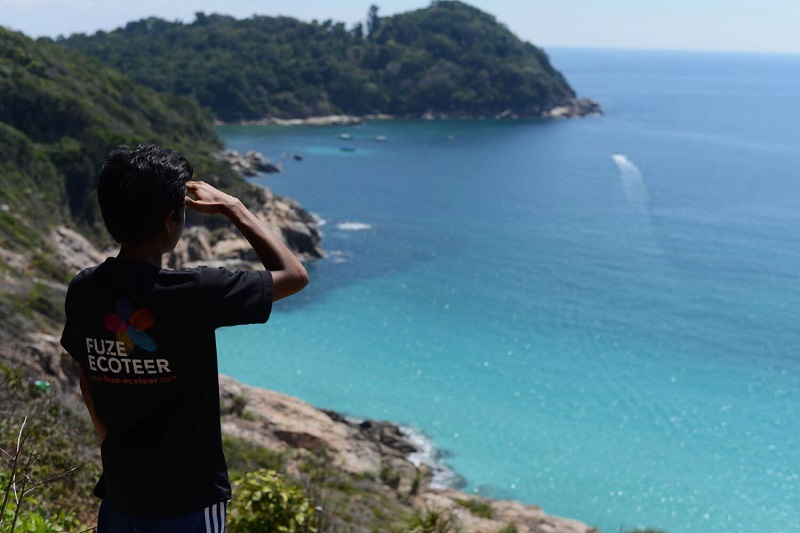
Turtles have a distinct pattern behind their eyes, which acts like a fingerprint. By taking photos of the turtles, Fuze Ecoteer can track them and establish patterns in their lives. (All photos: Fuze Ecoteer)
Fuze Ecoteer is a social enterprise that aims to bring people closer to nature by focusing on conservation projects. As a registered tour operator, it organises trips and expeditions, and recruits volunteers to educate and help in each of its conservation endeavours.
Its co-founder Daniel Quilter moved to Malaysia in 2005, armed with his marine biology background and aiming to work in conservation, starting out with internships. “I interned with Borneo Eco Tours, which is a global leader for ecotourism. It also organises world ecotourism conferences and is very well known. After that, I interned with Sabah Parks for a year, and realised that I preferred being more focused on the coast,” he begins.
Quilter’s first full-time job was with a UK-based conservation tourism company that sent volunteers to Malaysia to work with a property called Bubbles Dive Resort on Pulau Perhentian Besar, Terengganu. “It went really well for the first year. I was the project manager for the turtle project, but in 2008, the recession hit and the company went bust. I didn’t have a job anymore. So, I told Bubbles, ‘It’s okay, I will take over’.”
At the time, Quilter had a voluntourism website called Ecoteer, which aimed to link travellers with conservation projects worldwide. He used that to attract volunteers for his turtle conservation project with Bubbles, which eventually led to the Perhentian Turtle Project. “We work with the fisheries department to protect turtles on the island,” he says.
dan_cu.jpg

Soon, schools came knocking. “School groups were interested in doing fun games and educational stuff, and also team building. We saw a niche in the market,” Quilter explains. “In 2014, my partner Pavin Damadram had his own company called Fuze, which was focused on mentoring and team building. So, we merged the two and became Fuze Ecoteer. We are a unique entity, as we have a team-building as well as a conservation focus.”
Another benefit of introducing programmes for schools is that Fuze Ecoteer has more consistent funding for its conservation projects. In addition to local schools and those from around the world, corporate groups also take part in its programmes. “For instance, American Express will send us about 600 of its staff for over five different programmes throughout the year. So, we do things such as beach clean-ups, release hatchlings, tree planting and other kinds of volunteering,” Quilter explains.
Volunteers have access to a range of activities. For instance, under the Perhentian Turtle Project, they undertake beach patrols to look for turtle nests, taking photos of the sea turtles for tracking and research.
While ecotourism and voluntourism are not new concepts, they often have a bad reputation. Quilter explains that ensuring Fuze Ecoteer’s practices are sustainable to the local community as well as the environment should always be at the heart of its work. “When we have school groups, we don’t stay in big hotels; we stay in the village. It becomes a sort of homestay. We don’t own our own boats; instead, we use the services of the villagers so that they benefit financially. A big part of sustainable tourism is helping the local communities,” he says.
pep_2018_volunteer_with_perhentian_view.jpg

In 2019, Fuze Ecoteer introduced ecobricking — volunteers and participants pack their plastic waste into a plastic bottle, which can be used to make structures such as furniture or garden walls.
Fuze Ecoteer has achieved the highest level of social enterprise accreditation from the Malaysian Global Innovation & Creativity Centre (MaGIC), which means 25% of its sales go directly to conservation projects. Currently, it has three main ones: Perhentian Turtle Project; Perhentian Eco Education Project, which has a more educational focus, especially for the younger generation; and Perhentian Marine Research Station, which allows volunteers to learn to dive, collect data for research and help restore corals.
Another undertaking is the Wildlife Rescue & Care project in Indonesia, where Fuze Ecoteer recruits volunteers for The Wildlife Rescue Centre Jogja, which helps rehabilitate injured wildlife in the area.
Quilter has also been very concerned about pollution. “Plastic has always stalked me. My first night in Malaysia, I was based in Kota Kinabalu. There’s a place near a market where you can watch the sun set over the island. But when you looked down into the water, it was all covered with plastic everywhere. So, I’ve always wanted to kind of recycle plastic and do something with it.”
When he was introduced to the Precious Plastic Universe, his wish to recycle plastic became a reality. “When you go into recycling, you look into the machines and they are always so big; it’s like you need a billion ringgit. With Precious Plastic, they are basically open-source machines that you can build yourself. All the instructions on how to build them are online for free. It means we can build the machines for RM5,000. It’s a lot more realistic.”
When the pandemic hit, halting tourism and the bulk of Fuze Ecoteer’s income, it had to pivot fast. “We had around 13 staff members, but now we’re down to three, who are the project managers. We basically fund the projects with donations and grants, so we’ve gone the NGO route for now. Also, when we started up the Precious Plastic machines, it was more of an educational tool. But, now, I have one of the machines in my house. I get all the plastic waste from the river and make things like coasters and flower boxes,” Quilter says.
From selling these recycled items, he has created another income stream for the conservation projects. He hopes more corporate entities will order the items to further fund the conservation projects.
Three volunteers in Perhentian who attended Fuze Ecoteer’s school programmes have trained to dive and are now part of the conservation unit. “Our goal this year is to train them to collect ghost nets, which are old fishing nets that have been discarded and are found floating in the sea. They attract a lot of sharks and are dangerous. So, if there are any reports by people in Perhentian, these guys can go and collect the nets, like a rapid response conservation unit.”
Fuze Ecoteer was recently asked by Reef Check Malaysia — which is part of the global non-profit organisation that leads citizen scientists to promote stewardship of sustainable reef communities worldwide — to start a co-management group for the islands.
“It gives the villagers, diving centres and resorts a chance to voice their opinions on the management of the beaches and care of the marine species in the area and to make decisions. This is an amazing step by the government and Reef Check. It is changing the management of marine parks in Malaysia. They already have this in Tioman, we’re handling Perhentian and they’re also looking at Redang,” Quilter says.
“It is really important that people realise everyone can be a conservationist. You can do small things like recycling, or if you see pollution going into a river, you can report it.”
This article first appeared on July 26, 2021 in The Edge Malaysia.


